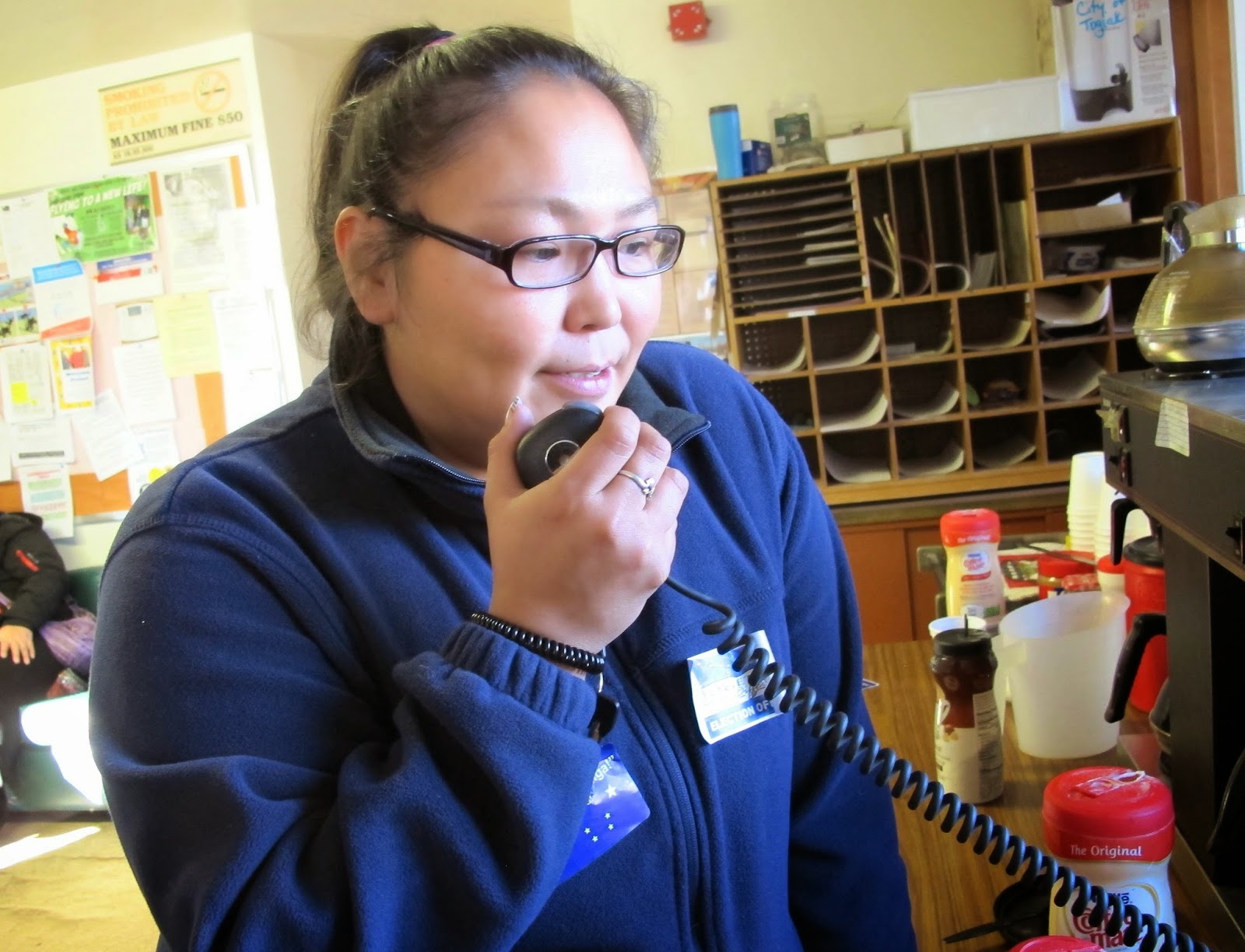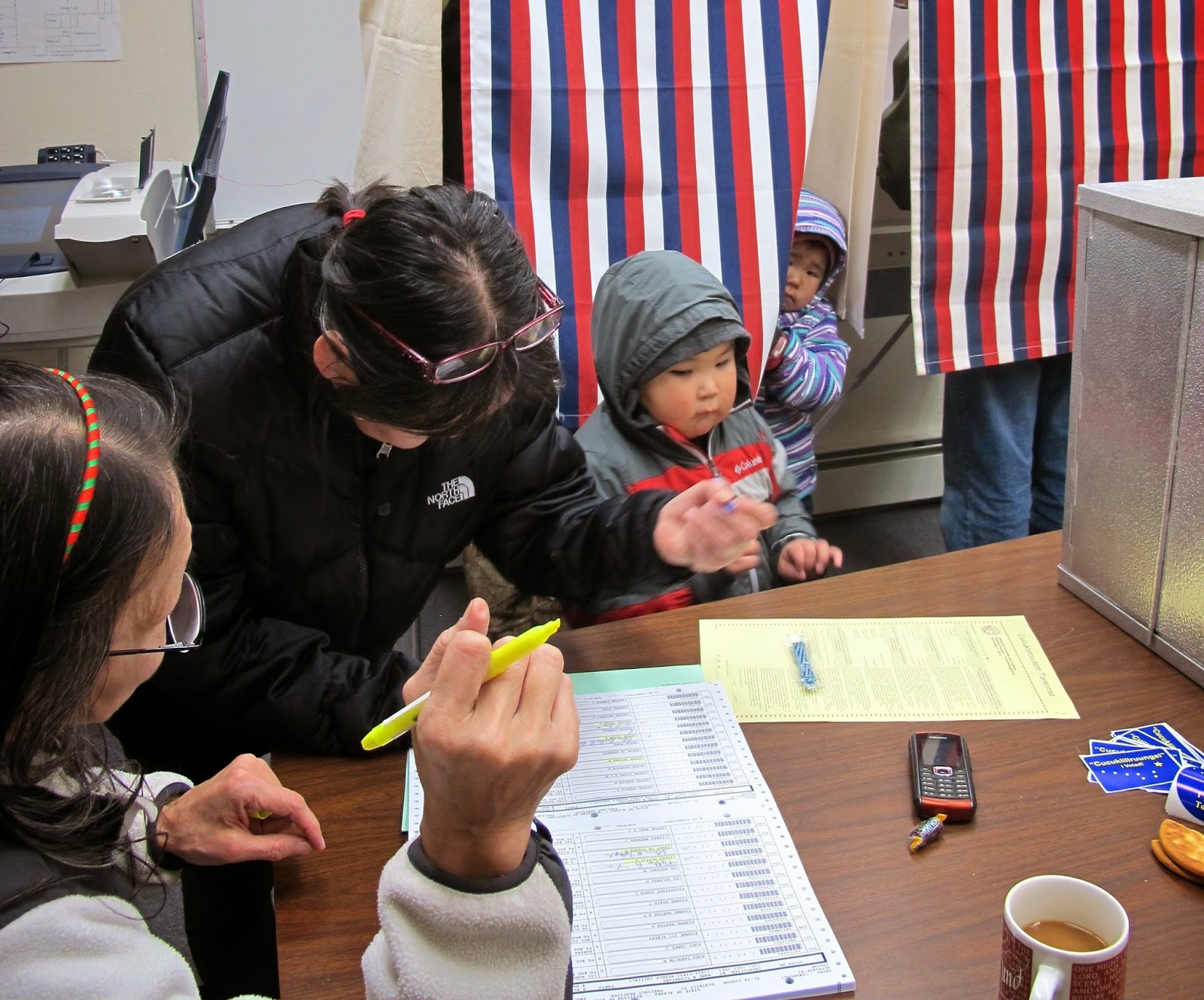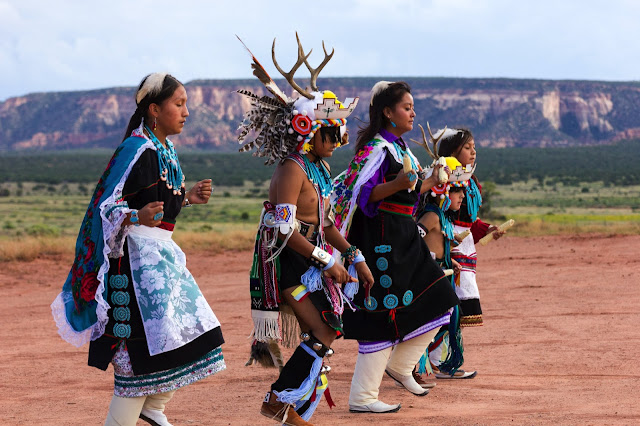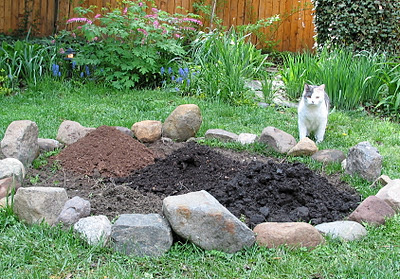Election Day Dawns in an Alaska Native Village
This article appeared on Indian Country Media Network in 2014. For more on topics like this, see my book, American Apartheid: The Native American Struggle....
 This morning, as the sun rises behind
dramatic snowy mountains and glistens on the water of Togiak Bay, voters from
an Alaska Native town of about 1,000 are heading for the polls. Life-changing
ballot measures, increased voting access, improved language assistance and a
sense that Native voters have newfound clout are converging to make Election
2014 a big one in Togiak, Alaska.
This morning, as the sun rises behind
dramatic snowy mountains and glistens on the water of Togiak Bay, voters from
an Alaska Native town of about 1,000 are heading for the polls. Life-changing
ballot measures, increased voting access, improved language assistance and a
sense that Native voters have newfound clout are converging to make Election
2014 a big one in Togiak, Alaska.
 Simultaneously, Alaska Natives’ voting
access has suddenly increased. About 200 villages have early-voting sites this
year, most for the first time. Though official figures are not yet available,
turnout appears high. Togiak’s absentee voting official Andrea Logusak ran out
of ballots twice during Alaska’s two-week early-voting period. “People kept
coming and coming,” she said.
Simultaneously, Alaska Natives’ voting
access has suddenly increased. About 200 villages have early-voting sites this
year, most for the first time. Though official figures are not yet available,
turnout appears high. Togiak’s absentee voting official Andrea Logusak ran out
of ballots twice during Alaska’s two-week early-voting period. “People kept
coming and coming,” she said.
 Cejka is going door-to-door to offer Togiak
residents Election Day rides to the polls. So are Stephanie Poulsen and Angel
Ayojiak, shown here; they are among the voter support specialists hired throughout the
region by Grace Mulipola, Bristol Bay Native Corporation’s early-voting project
manager.
Cejka is going door-to-door to offer Togiak
residents Election Day rides to the polls. So are Stephanie Poulsen and Angel
Ayojiak, shown here; they are among the voter support specialists hired throughout the
region by Grace Mulipola, Bristol Bay Native Corporation’s early-voting project
manager.
As the election winds down, the whole village is invited to a potluck at
the senior center. They’ll celebrate exercising their right to vote and, they
hope, the success of the candidates and ballot measures they supported.
Text and photographs c. Stephanie Woodard.
 This morning, as the sun rises behind
dramatic snowy mountains and glistens on the water of Togiak Bay, voters from
an Alaska Native town of about 1,000 are heading for the polls. Life-changing
ballot measures, increased voting access, improved language assistance and a
sense that Native voters have newfound clout are converging to make Election
2014 a big one in Togiak, Alaska.
This morning, as the sun rises behind
dramatic snowy mountains and glistens on the water of Togiak Bay, voters from
an Alaska Native town of about 1,000 are heading for the polls. Life-changing
ballot measures, increased voting access, improved language assistance and a
sense that Native voters have newfound clout are converging to make Election
2014 a big one in Togiak, Alaska.
City council member Andrew Franklin said the
community was particularly interested in a ballot measure that would help keep a large mining operation out of nearby Bristol Bay, the world’s largest sockeye-salmon
fishery. The fishery is a huge
local employer and the linchpin of the area’s hunting and gathering lifeways. “We’re
really afraid of losing the salmon, along with moose, caribou and other game,”
said Franklin. “Everywhere mines have gone in, they’ve made a mess, and that
would hurt a lot of people.” Another referendum that caught their attention was a measure to increase the minimum wage. “This is a very serious election,” said
Franklin.
 Simultaneously, Alaska Natives’ voting
access has suddenly increased. About 200 villages have early-voting sites this
year, most for the first time. Though official figures are not yet available,
turnout appears high. Togiak’s absentee voting official Andrea Logusak ran out
of ballots twice during Alaska’s two-week early-voting period. “People kept
coming and coming,” she said.
Simultaneously, Alaska Natives’ voting
access has suddenly increased. About 200 villages have early-voting sites this
year, most for the first time. Though official figures are not yet available,
turnout appears high. Togiak’s absentee voting official Andrea Logusak ran out
of ballots twice during Alaska’s two-week early-voting period. “People kept
coming and coming,” she said.
Improved language assistance—thanks to
the recent, successful Toyukak v.
Treadwell voting-rights lawsuit—makes it easier for those who are not
proficient in English to vote. “One elder had trouble with the English ballot,
but when I gave him a Yup’ik one, he had no more questions and was done voting
in a few minutes,” Logusak said.
“People here have felt disenfranchised,
but now they don’t,” said Corey Cejka. She is a village field organizer for
Democrat Mark Begich, who is trying to hold on to his Senate seat. If he wins,
it’ll likely be due to backing from Alaska Natives, largely because of his
support for their subsistence hunting and fishing rights. This year, the Native
vote is a crucial swing vote in several races, including for the Senate in South
Dakota and for the House in Montana and Arizona.
 Cejka is going door-to-door to offer Togiak
residents Election Day rides to the polls. So are Stephanie Poulsen and Angel
Ayojiak, shown here; they are among the voter support specialists hired throughout the
region by Grace Mulipola, Bristol Bay Native Corporation’s early-voting project
manager.
Cejka is going door-to-door to offer Togiak
residents Election Day rides to the polls. So are Stephanie Poulsen and Angel
Ayojiak, shown here; they are among the voter support specialists hired throughout the
region by Grace Mulipola, Bristol Bay Native Corporation’s early-voting project
manager. Text and photographs c. Stephanie Woodard.

